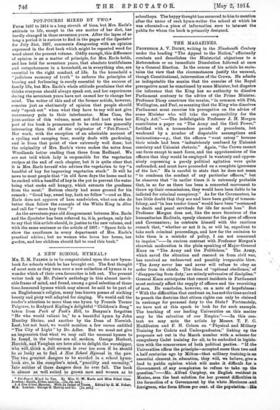POT-POURRI MIXED BY TWO.* Fiscal 1897 to 1914 is a
long stretch of time, but Mrs. Earle's attitude to life, except in the one matter of her diet, has hardly changed in these seventeen years. After the lapse of so long a period it is curious to find in the pages of the Spectator for July 91st, 1897, comments disagreeing with an opinion expressed in the first book which might be repeated word for word about the present volume. Oddly enough, this difference of opinion is on a matter of principle, for Mrs. Earle holds, and has held for seventeen years, that absolute truthfulness and outspokenness in a household, as in everything else, are essential to the right conduct of life. In the household a "judicious economy of truth " to enforce the principles of bearing and forbearing is surely essential to the success of family life, but Mrs. Earle's whole attitude proclaims that she thinks everyone should always speak out, and her experiences during the seventeen years have not caused her to change her mind. The writer of this and of the former article, however, remains just as obstinately of opinion that people should only "speak out" when what they have to say will not give unnecessary pain to their interlocutor. Miss Case, the joint-author of this volume, must not feel hurt when her part of the book is pronounced to be rather less generally interesting than that of the originator of " Pot-Pourri." Her work, with the exception of an admirable account of a cycling and camping tour, mostly deals with gardening, and is from that point of view extremely well done; but the originality of Mrs. Earle's views makes the notes from Woodlands better reading than those from Redbazel. We are not told which lady is responsible for the vegetarian recipes at the end of each chapter, but it is quite clear that it is Mrs. Earle herself who advises the vegetarian to try "a handful of hay for improving vegetarian. stock." .It will be news to most people that "in old farm days the hams used to be cooked with a handful of hay in the pot to prevent the water being what cooks call hungry, which extracts the goodness from the meat." Bottom clearly had some ground for his remark : "Good hay, sweet bay, bath no fellow "—and as Mrs. Earle does not approve of ham sandwiches, what can she do better than follow the example of the White King in Alice and call for "more hay then" ?
As-the seventeen-year-old disagreement between Mrs. Earle and the Spectator has been referred to, it is, perhaps, only fair to say that this article should, in justice to the new volume, end with the same sentence as the article of 1897: ".Space fails to show the excellence in. -every department of Mrs. Earle's practical advice; but no woman who loves her house, her garden, and her children should fail to read this book."














































 Previous page
Previous page